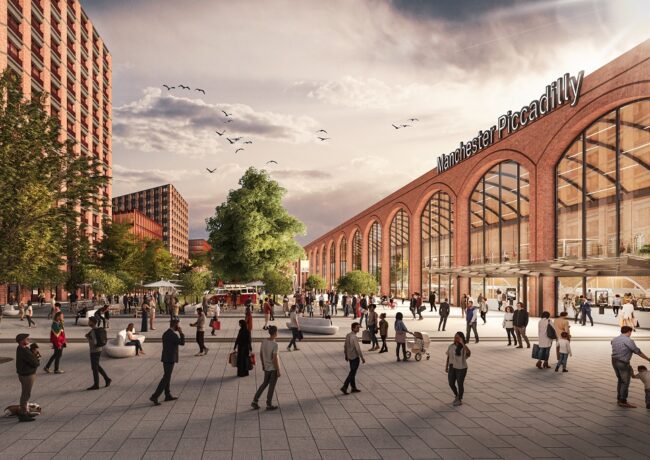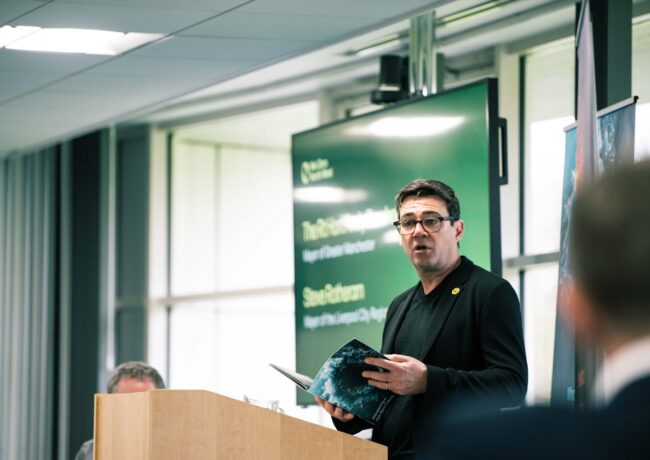GM mayor to get London-style bus powers
Transport leaders in Greater Manchester have welcomed the publication of the Bus Services Bill, a new piece of legislation which will enable an elected Mayor to franchise bus services.
The Bill, which proposes powers to allow Combined Authorities with an elected Mayor to franchise bus services, will enable Greater Manchester to create an integrated, London-style transport network with a simple fares and ticketing system and consistent quality standards.
Bus franchising, a model used in other global cities, including London, Sydney and Amsterdam, would enable Greater Manchester Combined Authority to take control of bus service planning with private operators contracted to run routes under a franchise agreement.
Cllr Andrew Fender, chairman of Transport for Greater Manchester Committee, said: “Under a franchised system the elected Mayor for Greater Manchester will have the ability to decide the routes, frequencies, timetables, fares and quality standards for bus services in the city region.
“This will help deliver a consistent, integrated transport network and make it possible for every passenger to use their tickets on any bus in Greater Manchester, as well as other forms of public transport.
“It will place the customer at the heart of Greater Manchester’s transport network and enable the reinvestment of funds back into transport.”
Greater Manchester currently has a deregulated bus system, where 80 per cent of services are provided on a commercial basis by bus companies. For these services the routes, fares, frequencies and quality standards are decided by the bus operators. Neither GMCA nor TfGM have any control over commercial bus services.
Bus services play a significant role in Greater Manchester’s transport network with over 210 million journeys in 2015. That accounts for 79% of all public transport journeys compared to 9% by train and 12% by tram. Despite a growing population and increased demand on the transport network, overall bus use in Greater Manchester has flat-lined in recent years.
The option to implement bus franchising powers was requested by GMCA as part of the Greater Manchester Devolution Agreement signed with the Government in November 2014. The power for an elected Mayor to choose to implement bus franchising has benefited from cross-party political support amongst Greater Manchester’s Leaders.
Interim Mayor of Greater Manchester, Tony Lloyd, said: “It is absolutely right that Greater Manchester should have the ability to decide what transport network it wants and needs to help support our city-region and its growing economy.
“Alongside other devolved powers over health, housing and skills, the powers outlined in the Bus Services Bill would allow our region to plan strategically for the future and ensure that transport links people with jobs, skills and education.
“The ability to strategically manage the transport network means a better deal for passengers and ensures that bus plays a full role as part of an integrated, reliable, safe, clean and affordable transport network. The Bus Services Bill is an important step in making this possible.”




About time we entered the 21st century. Next step surely has to be standard fares regardless of distance travelled.
By M40
I can see free prescriptions in GM soon too.Particularly if Andy Burnham becomes Mayor.Battle royals ahead with Whitehall.Good news about transport.For too long our great regional cities have subsidised Londoners.Let us hope that the other great conurbations can get the same very soon.
By Elephant
“Our great regional cities have subsidised Londoners” – the move to mayors is great news but lets not delude ourselves that we have been subsidising the prosperous London! Cities like Liverpool and Manchester need to show they can add value in the same way that London does; Manchester is getting there but we all have a way to go. Silly comment, Elephant.
By Anonymous
Transport wise the whole of the UK subsidises London’s cheap fares.The same companies charge us extortionate fares to make up the losses they make in London.A fare from Central London to Hampstead,which is the same distance as Altrincham is £1.30.I rest my case.London was never deregulated.We have subsidised their cheap fares since the 1980s.
By Elephant
In basic terms, the way this country works London subsidises our welfare, we subsidise their transport infrastructure… oh and their schools given yesterday’s IPPR / TeachFirst report!
By Anon
Elephant. Why would a bus company run their London operation at a loss? Private companies aren’t into “subsidising” their loss-making units, your argument doesn’t make sense.
Most bus companies run their different units (Manchester, Merseyside, North London, South London, etc), as separate entities so they know where they’re making the money and where they’re not. The routes you describe are cheap because they are well-patronised.
By creep
London buses are cheap because they’re regulated and services are franchised by TfL rather than the free market free-for-all that exists in the rest of the country. The superior quality, frequency and coverage was only achieved with a special subsidy paid to TfL that a few years ago was of the order of £1bn.
By Anon
So presumably the 135 from Bury to Manchester is not well patronised then? The same distance by First services in London costs a quarter of the that journey.This is because there is regulation around the fares.Large cities like Manchester and Liverpool make up the shortfall of this regulation for these companies.Aviva run many services in the capital as they do in the North West at a fraction of the cost.I have lived in London and I know that the UK’s other big cities fares are considerably dearer because these companies can charge what they want.
By Elephant
The cost? Makes me laugh when pay ONE Euro to travel up to 20 miles single, in Southern France, on a bus. I live just 1.5 miles from Manchester City Centre and a single costs £2.20..
By Schwyz
That’s because public transport in France is subsidised. Unlike the UK, where it is mostly NOT subsidised. Elephant still hasn’t demonstrated how the regions are subsidising the capital.
By creep
I think the point elephant is making is that operators increase prices outside London to compensate for the lower margins on their franchised routes in London. I’m not sure if that link can be demonstrated in anything other than anecdotal terms though.
By Anon
Like most businesses, they make the maximum margin possible in the local market. Prices in London have nothing to do with prices in the north.
By creep
I don’t think there will be any evidence in plain English Anon that says.We charge people in Oldham and Stockport two pounds for two stops,because we can only charge people in Lewisham and Edmonton a pound for a ten mile journey.It sticks in my throat though that we have at the moment to put up with this prejudice outside London.
By Elephant
Its not prejudice, its that the operators are able to do it because of deregulation outside of London. This is exactly what the London-style bus powers for GM is intended to solve.
We’re not subsidising London.
By creep
We did subsidise London’s buses through the annual treasury subsidy paid to make their franchising system work though. And we heavily subsidise capital spend in London too.
By Anon